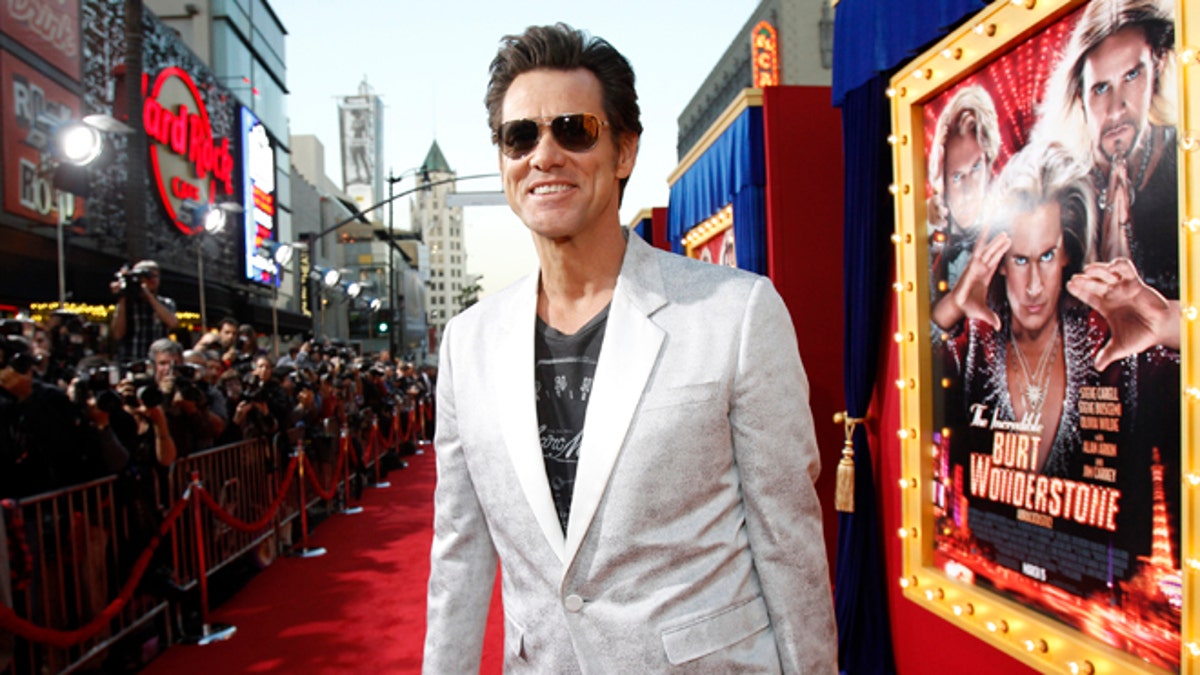
Cast member Jim Carrey attends the premiere of "The Incredible Burt Wonderstone" in Hollywood, California March 11, 2013. (Reuters)
LOS ANGELES – Jim Carrey injected himself into the headlines this week when he took to Twitter to blast his forthcoming comic-inspired super-hero flick “Kick Ass 2.” Carrey withdrew his support for the Chloe Moretz-starring movie because he filmed it “a month b4 Sandy Hook and now in all good conscience (he) cannot support that level of violence.”
But experts tell FOX411's Pop Tarts column that Carrey may have tweeted without thinking of possible legal ramifications.
“Publicity, promotion and marketing are just as important to the success of a film as the quality of the film itself, and it is crucial for a distributor to tightly control all aspects of the branding and imaging of the film,” Hollywood producer Gary Michael Walters told FOX411 Pop Tarts column. “The support of the actors and director in promoting a film is extremely helpful, indeed vital, and studios and financers almost always require their key talent to do a certain amount of publicity for their movies. At a minimum, an actor contract would provide that the talent could not do publicity without studio approval and there is generally a non-disparagement provision as well.”
A well-placed industry insider noted that there is almost always “a publicity clause written into the contracts, even into the initial Talent Offer” which Carey most likely violated.
A typical contract usually contains wording along the lines of this legalese: “Artist shall render a reasonable amount of publicity/promotional services for the Picture, and if requested by the Picture’s distributors, including, without limitation, in connection with press junkets and early morning and late night network talk shows in the US or elsewhere if required. All publicity will be subject to Artist’s professional availability in connection with a bona fide prior commitment.”
Another industry player said that Carrey is likely in breach of his agreement, as contracts state one can’t say anything negative about the project. So Universal Pictures could go after him for damages, although we’re told studios “generally don’t make it a habit to sue A-list celebrities.”
“It likely won’t turn into much more than a wrist slap,” said the source.
Carrey was perhaps pre-empting the backlash he might have received had he actively promoted the movie, given the media stir he fired off in March with a Funny or Die skit entitled “Cold Dead Hand" in which the actor gave unflattering impersonation of the late NRA spokesman Charlton Heston before shooting himself in the foot.
Confusingly, Carrey reportedly held an anti-gun stance well before the Newtown shootings, and well before he signed on to the “Kick Ass” role, which is scheduled to hit cinemas in August.
“It’s rather hypocritical for Jim to take a major paycheck and ‘withdraw’ support for an upcoming film that he appears in. From a brand perspective, one may wonder why he appears in a movie which he is against. This commentary is likely to hurt the film,” noted publicist Ronn Torossian, CEO of 5WPR. “This may lead others in the film business to reconsider casting Carrey. Sometimes silence is golden.”
Others doubt anything Carrey says or does will have any effect on the film's success or lack thereof.
“The studio system minds know that the current PG-13/R crowd has no idea who Jim is or the movies and TV shows that he is famous for. There is nothing he could say publicly that could sway the crowds – the entire publicity is built on Chloe Moretz, her ‘Hit Girl’ character and the ‘Kick Ass’ title,” a movie insider added. “The studio could cut Jim’s scenes from the film entirely and the audience wouldn’t know the difference. I don't think anyone respects his voice anymore because Hollywood knows his Hollywood stock has dropped tremendously.”
Universal Pictures, as well as a rep for Carrey, declined to comment.






